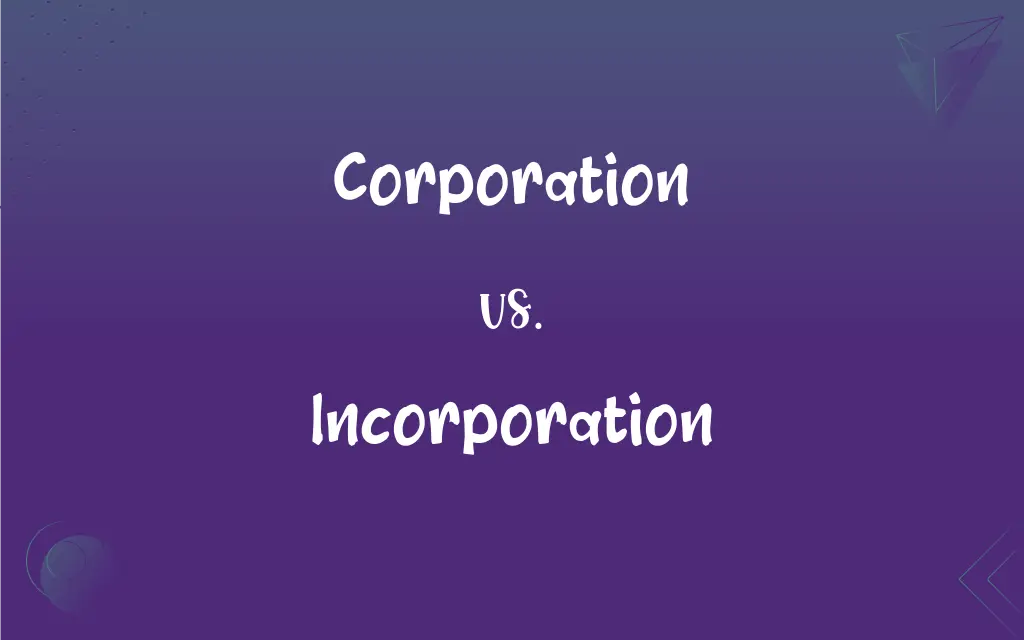Corporation vs. Incorporation: What's the Difference?
Edited by Aimie Carlson || By Janet White || Published on January 23, 2024
A corporation is a legal entity formed by a group of individuals to conduct business, whereas incorporation is the process of legally declaring a corporate entity distinct from its owners.

Key Differences
A corporation is an organized group of individuals legally regarded as a single entity, which can be involved in business, non-profit activities, or government functions. Incorporation refers to the legal process of forming a corporation, establishing its separate legal identity from its founders or shareholders.
Corporations can enter into contracts, own assets, and be liable for debts, effectively functioning as legal persons. The act of incorporation creates this legal personhood, providing the corporation with its own legal rights and obligations.
The structure of a corporation typically includes shareholders, a board of directors, and officers; these roles define the governance and operation of the corporation. Incorporation is the initial step that allows a group of people or an organization to operate under these structured roles legally.
Corporations are subject to specific tax laws and can benefit from limited liability for their shareholders. Through incorporation, a business gains this limited liability, protecting individual shareholders' personal assets from corporate debts and liabilities.
The concept of a corporation can vary globally, but it generally represents an entity that can hold property, sue or be sued. Incorporation procedures also vary by jurisdiction but generally involve filing documents, such as articles of incorporation, with a governmental authority.
ADVERTISEMENT
Comparison Chart
Definition
A legally recognized entity formed by individuals or organizations
The process of legally forming a corporation
Legal Status
Has its own legal identity separate from its founders
Grants legal identity to a business entity
Functions
Can own assets, enter contracts, and be liable for debts
Formalizes the legal status and structure of an entity
Structure
Includes shareholders, board of directors, and officers
Process that establishes the corporate structure
Liability and Protection
Offers limited liability to its shareholders
Provides legal protection to shareholders’ personal assets
ADVERTISEMENT
Corporation and Incorporation Definitions
Corporation
A corporation is formed by individuals, shareholders, or stakeholders.
He became a major shareholder in the corporation.
Incorporation
Incorporation involves filing necessary documents with the government.
They filed their articles of incorporation with the state office.
Corporation
A corporation can be for-profit, non-profit, or governmental.
The non-profit corporation focused on environmental conservation.
Incorporation
Incorporation is the process of legally forming a corporation.
The small business completed its incorporation last week.
Corporation
Corporations are capable of owning property and entering into contracts.
The corporation purchased a new office building downtown.
Incorporation
Incorporation can offer tax benefits and liability protection.
Their incorporation led to favorable tax treatment and asset protection.
Corporation
A corporation is a legal entity that can conduct business.
The corporation expanded its operations internationally.
Incorporation
Incorporation establishes a business as a separate legal entity.
Through incorporation, their business gained its own legal identity.
Corporation
Corporations have limited liability, protecting owners' personal assets.
The corporation's limited liability ensured the owners' homes were safe from business debts.
Incorporation
Incorporation provides a framework for the governance of a corporation.
Incorporation helped them set up a board of directors.
Incorporation
To unite (one thing) with something else already in existence
Incorporated the letter into her diary.
Incorporation
To admit as a member to a corporation or similar organization.
FAQs
What is a corporation?
A legal entity that can conduct business.
Can a corporation own property?
Yes, it can own property in its name.
Do corporations have limited liability?
Yes, they provide limited liability to shareholders.
What is the purpose of incorporation?
To establish a business as a separate legal entity.
What does incorporation mean?
The process of legally forming a corporation.
What are the tax implications of incorporation?
They vary but can include corporate tax rates and deductions.
What documents are needed for incorporation?
Typically articles of incorporation and other legal documents.
Can a corporation sue or be sued?
Yes, it has legal standing in court.
Is incorporation necessary for all businesses?
It's recommended for limited liability and legal benefits.
How does incorporation protect shareholders?
By separating personal assets from business liabilities.
Can a corporation issue stocks?
Yes, corporations can issue stocks to shareholders.
How long does the incorporation process take?
It varies, but it can take from a few days to several weeks.
Are non-profit organizations considered corporations?
They can be, if incorporated as such.
Does incorporation affect business credit?
It can, as the corporation builds its own credit history.
Who governs a corporation?
A board of directors and officers.
What's the difference between a company and a corporation?
A corporation is a specific legal form of a company.
Can a single person form a corporation?
Yes, one person can incorporate a business.
Can a foreign entity be incorporated in the U.S.?
Yes, through specific legal processes and requirements.
Do corporations have perpetual existence?
Generally, they can continue indefinitely.
What are the annual requirements for a corporation?
These include annual reports, taxes, and maintaining corporate formalities.
About Author
Written by
Janet WhiteJanet White has been an esteemed writer and blogger for Difference Wiki. Holding a Master's degree in Science and Medical Journalism from the prestigious Boston University, she has consistently demonstrated her expertise and passion for her field. When she's not immersed in her work, Janet relishes her time exercising, delving into a good book, and cherishing moments with friends and family.
Edited by
Aimie CarlsonAimie Carlson, holding a master's degree in English literature, is a fervent English language enthusiast. She lends her writing talents to Difference Wiki, a prominent website that specializes in comparisons, offering readers insightful analyses that both captivate and inform.






































































